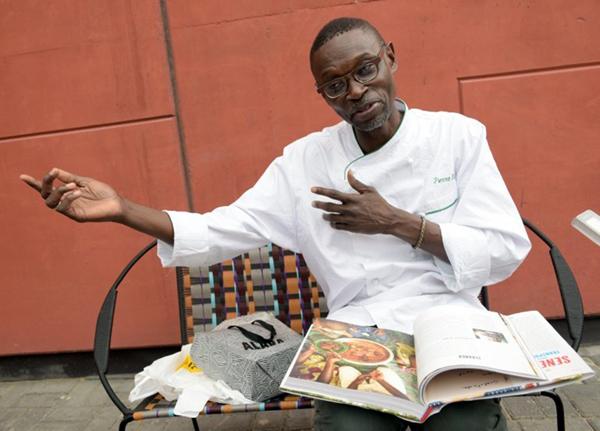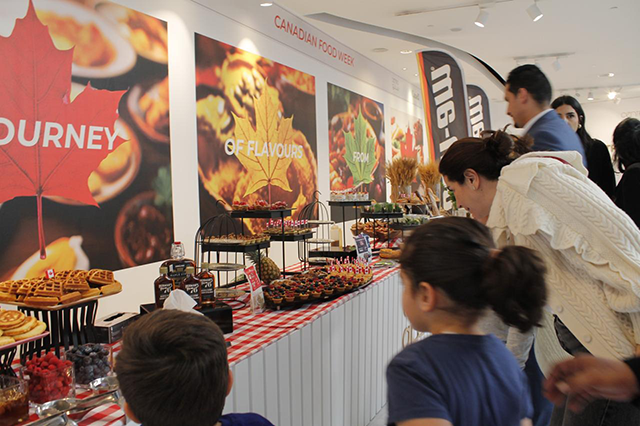You are here
From street food to fine dining in Lagos
By AFP - Mar 05,2016 - Last updated at Mar 05,2016

Senegalese pioneer of African cuisine Pierre Thiam speaks about his food at Nok By Alara, a restaurant in Victoria Island district of Lagos, on January 14 (AFP photo)
LAGOS — An ambitious restaurant in Lagos is setting out to elevate Nigerian street food staples to fine dining, tapping into a growing hunger in the city for upscale West African food.
Classic West African dishes, passed down from mother to daughter for generations and served today in busy streetside canteens, are revisited in “Nok By Alara” by Pierre Thiam, a Senegalese pioneer of African cuisine.
Thiam’s menu scours the continent for inspiration, combining ancestral know-how with elements of popular cuisine.
The result, a fragrant lobster “pepe” — Nigerian pidgin English for pepper — soup, savoury sweet potato and plantain pancakes and hibiscus tarts.
“Coming to a country that isn’t your own and presenting a cuisine that aims to be inspired by this region is a tricky endeavour,” Thiam told AFP.
“I was expecting to meet some resistance,” he said, but was “pleasantly surprised” at the positive reaction.
“People are so happy to have these flavours from childhood.”
It’s not just the taste that has people hooked. At last, hearty West African food, usually visually bland, is plated with a discerning eye.
“This food that you grew up with is presented in a way that you would not expect,” food blogger Nosa Oyegun said.
“There’s that real fine dining with Nigerian food, which we had never seen anywhere, that’s really fascinating.”
Chemistry to cooking
Oyegun and Folayemi Agusto, better known as “Nosa and Folly”, run an influential food blog “Eat. Drink. Lagos”, where they review restaurants across the city.
Both in their 30s, they are among several thousand “repats” — people who have returned to Nigeria after studying overseas — living in Lagos.
The well-travelled returnees want Nigerian food but with the same level of service they experienced abroad.
Since Oyegan came back to Lagos in 2013, many restaurants have opened catering to the emerging middle class in Nigeria.
But amid the barrage of pizza shops and burger joints, few restaurants have tried to capitalise on local cuisine.
It’s a taboo Thiam finds ludicrous.
“Across the continent, there is a plethora of ingredients that are nutritious and full of flavour,” said Thiam, a tall, loquacious man wearing brown metal glasses and a white chef’s shirt embroidered with his name.
“And then we have techniques to be developed. Today, we talk about fermentation but we have known about it for thousands of years,” he said.
A chemist by training, Thaim said he didn’t think he could turn his passion for cooking into a full-time job.
He thought cooking was for women — until he left his native Senegal to work in New York and climbed the ranks from bus boy to chef.
Two restaurants and two books later, Thiam can claim he introduced a Western audience to African cuisine — and hopes to accomplish a similar feat in Lagos.
Samosa snails
As Thiam works to establish his restaurant, which opened its doors only in December, other young chefs are joining the growing Nigerian gourmet food movement.
On a Saturday in February, 12 guests gathered for a lunch club hosted by Stranger, a trendy hybrid store selling food, art and clothing that boasts an impressive collection of Japanese whisky and a careful selection of African coffees.
“Moving back here made me very excited just to have access to all these resources,” said Imoteda, a 29-year old recent graduate of the Cordon Bleu culinary and hospitality school in Britain.
“But the thing about Nigerians is that we eat for sustenance, we don’t bother to make the food beautiful, you know we just toss it on a plate,” she said with a laugh.
Yvette Dimiri, who returned to Nigeria a year ago to work in the oil industry, agrees.
Despite loving Nigerian food, Dimiri admits it can get heavy at times.
“Most of the food here is full of oil. And it’s mostly carb-based. We used to be farmers and we used to walk for kilometres, which is not the case anymore.”
In the kitchen, Ozoz Sokoh prepares snail samosas and chicken with green curry and “scent leaves”, a Nigerian plant that resembles the Japanese herb shiso.
During the week, Ozoz works as a geologist for Shell. But in the evenings and on weekends she’s known as “Kitchen Butterfly” and cooks delicious food for private clients.
Her dream, like Thiam, is to introduce a more refined kind of Nigerian food.
“I would love us in Nigeria to move from eating because we’re hungry, to celebrating Nigerian flavours, textures, colours,” she said.
“My dream would be to go to a Nigerian restaurant in Paris, maybe not with three Michelin stars yet, but to see people wowed, interested, curious about it.”
Related Articles
“I travel [to] different countries... to learn from the grandmothers. Then I get these old recipes and I bring it to my laboratory here and we try with my chefs to give it something of a modern touch,” he said.
AMMAN — The Canadian embassy is hosting Canada Week, a five-day celebration of Canadian cuisine and consumer goods.Held at CENTRO Store in A
By Ammu KannampillyAgence France-PresseMUMBAI — Every dish tastes better with a dash of soy sauce, even dessert: that’s the ambitious pitch


















